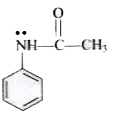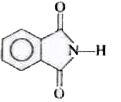Which of the following compounds are not base when dissolved?
K2O
Na2O2
NO2
Cl2O7
The correct Answer is:C,D
To determine which of the given compounds do not produce a base when dissolved in water, we will analyze each compound's reaction with water step by step.
Step 1: Identify the Compounds
The compounds given in the question are:
1. K2O (Potassium oxide)
2. Na2O2 (Sodium peroxide)
3. NaO2 (Sodium oxide)
4. Cl2O7 (Dichlorine heptoxide)
Step 2: Analyze Each Compound's Reaction with Water
1. K2O (Potassium oxide)
- When K2O is dissolved in water, it reacts as follows:
K2O+H2O→2KOH
- KOH (Potassium hydroxide) is a strong base because it contains OH⁻ ions.
2. Na2O2 (Sodium peroxide)
- When Na2O2 is dissolved in water, it reacts as follows:
Na2O2+2H2O→2NaOH+H2O2
- Here, NaOH (Sodium hydroxide) is produced, which is a strong base, along with H2O2 (Hydrogen peroxide), which is a weak acid.
3. NaO2 (Sodium oxide)
- When NaO2 is dissolved in water, it reacts as follows:
NaO2+H2O→HNO3+HNO2
- This reaction produces HNO3 (Nitric acid) and HNO2 (Nitrous acid), both of which are acids and do not produce a base.
4. Cl2O7 (Dichlorine heptoxide)
- When Cl2O7 is dissolved in water, it reacts as follows:
Cl2O7+H2O→2HClO4
- HClO4 (Perchloric acid) is produced, which is a strong acid and does not produce a base.
Step 3: Conclusion
From the analysis:
- K2O produces a strong base (KOH).
- Na2O2 produces a strong base (NaOH).
- NaO2 produces acids (HNO3 and HNO2).
- Cl2O7 produces a strong acid (HClO4).
Thus, the compounds that do not produce a base when dissolved in water are NaO2 and Cl2O7.
Final Answer
The compounds that are not bases when dissolved are:
- NaO2
- Cl2O7
---
The compounds given in the question are:
1. K2O (Potassium oxide)
2. Na2O2 (Sodium peroxide)
3. NaO2 (Sodium oxide)
4. Cl2O7 (Dichlorine heptoxide)
- When K2O is dissolved in water, it reacts as follows:
K2O+H2O→2KOH
- KOH (Potassium hydroxide) is a strong base because it contains OH⁻ ions.
- When Na2O2 is dissolved in water, it reacts as follows:
Na2O2+2H2O→2NaOH+H2O2
- Here, NaOH (Sodium hydroxide) is produced, which is a strong base, along with H2O2 (Hydrogen peroxide), which is a weak acid.
- When NaO2 is dissolved in water, it reacts as follows:
NaO2+H2O→HNO3+HNO2
- This reaction produces HNO3 (Nitric acid) and HNO2 (Nitrous acid), both of which are acids and do not produce a base.
- When Cl2O7 is dissolved in water, it reacts as follows:
Cl2O7+H2O→2HClO4
- HClO4 (Perchloric acid) is produced, which is a strong acid and does not produce a base.
From the analysis:
- K2O produces a strong base (KOH).
- Na2O2 produces a strong base (NaOH).
- NaO2 produces acids (HNO3 and HNO2).
- Cl2O7 produces a strong acid (HClO4).
The compounds that are not bases when dissolved are:
- NaO2
- Cl2O7
Similar Questions
Knowledge Check
- Question 1 - Select One
Which of the following compounds is strongest base?
A B
B C
C D
D
- Question 2 - Select One
Which of the following compounds are formed when BCI3 is treated with water?
AH3BO3BB2H6CB2O3DHBO2 - Question 3 - Select One
Which of the following compounds can react with base to form salt?
A B
B C
C D
D
Which of the following is the strongest base ?
View SolutionWhich of the following is the strongest base:
View SolutionWhich of the following compounds will not dissolve in aqueous NaOH?
View SolutionWhich of the following compounds is formed when sodium burns in excess supply of air?
View SolutionWhich of the following compound does not undergo base - catalyzed exchange in D2O even though it has an α-hydrogen?
View Solution

